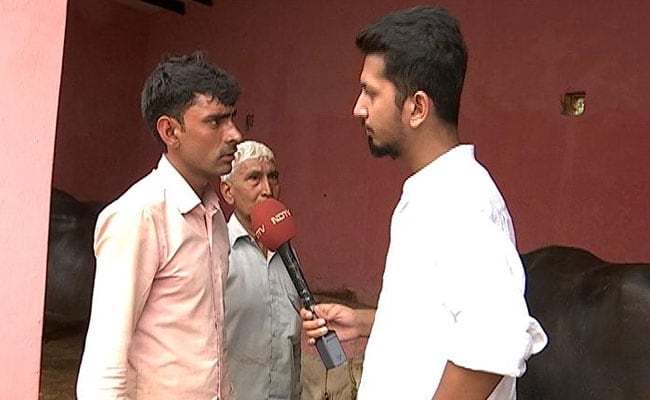Century old cattle market near UP's Bulandshahr wears deserted look after centre's beef ban
Bulandshahr, Uttar Pradesh:
About 22 km from Bulandshahr, a bustling town in western Uttar Pradesh, is a cattle market where traders and farmers gather to buy and sell every Monday. Locals say the weekly market is a century old. On this Monday, it wears a desolate look.
"Around 200-300 buffaloes were sold here every day, but now the business is less than a third of what it used to be", says Syed Aman, a third generation caretaker of the cattle market. The reason, he says, is the Centre's new rules, which forbid the sale of cattle for slaughter at animal markets. The markets will now be able to trade cattle only for agricultural purposes such as ploughing and dairy production.
The rules have yet to be formally enforced, but their impact is already being felt on the ground. At the market near Bulandshahr, our team met not a single buyer on Monday. The sellers, mostly farmers who came to sell their old or infirm buffaloes to slaughterhouses, slowly vacated the market, disappointed.
According to the market's administrators, the ban has disrupted a vital source of earning for the farmer. "A dairy farmer buys a buffalo for around Rs 40,000 to 50,000 depending on how much milk it can give. Once it becomes infirm he sells it to a slaughterhouse for around Rs 25,000 to 30,000," Mr Aman explained, adding that the farmer then "invests a few thousand more to buy another milk-yielding buffalo."
The new rules have ruptured this cycle.
After protests from several states, the government, sources said on Monday, might exclude buffaloes from the ban, but that decision is yet to be taken. Most of the beef in the country comes from buffalo rather than cows, which are sacred to Hindus, but local cattle traders and slaughterhouses have repeatedly come under attacks from activist groups that oppose the meat trade.
 Around four kilometres from the market, Naresh Kumar, 24, a dairy farmer says the lack of buyers means he has to keep three infirm buffaloes at home. "Now that they're not letting us sell buffaloes. I have no money, I don't even have place to tie more buffaloes. My parents are sick," he said.
Around four kilometres from the market, Naresh Kumar, 24, a dairy farmer says the lack of buyers means he has to keep three infirm buffaloes at home. "Now that they're not letting us sell buffaloes. I have no money, I don't even have place to tie more buffaloes. My parents are sick," he said.
Mr Kumar said his only recourse now will be to "feed them till I can and then I will have to leave them out on the road."
Meat traders say the new rules threaten $ 4 billion in annual buffalo meat exports and millions of jobs in the meat industry if they are not reversed. They have alleged that the government has attempted to impose a ban on the Muslim-dominated meat industry, and plan to petition the Supreme Court in the next few days to get the government order rescinded.
"Around 200-300 buffaloes were sold here every day, but now the business is less than a third of what it used to be", says Syed Aman, a third generation caretaker of the cattle market. The reason, he says, is the Centre's new rules, which forbid the sale of cattle for slaughter at animal markets. The markets will now be able to trade cattle only for agricultural purposes such as ploughing and dairy production.
The rules have yet to be formally enforced, but their impact is already being felt on the ground. At the market near Bulandshahr, our team met not a single buyer on Monday. The sellers, mostly farmers who came to sell their old or infirm buffaloes to slaughterhouses, slowly vacated the market, disappointed.
According to the market's administrators, the ban has disrupted a vital source of earning for the farmer. "A dairy farmer buys a buffalo for around Rs 40,000 to 50,000 depending on how much milk it can give. Once it becomes infirm he sells it to a slaughterhouse for around Rs 25,000 to 30,000," Mr Aman explained, adding that the farmer then "invests a few thousand more to buy another milk-yielding buffalo."
The new rules have ruptured this cycle.
After protests from several states, the government, sources said on Monday, might exclude buffaloes from the ban, but that decision is yet to be taken. Most of the beef in the country comes from buffalo rather than cows, which are sacred to Hindus, but local cattle traders and slaughterhouses have repeatedly come under attacks from activist groups that oppose the meat trade.

The central government's new rules forbid the sale of cattle for slaughter at animal markets
Mr Kumar said his only recourse now will be to "feed them till I can and then I will have to leave them out on the road."
Meat traders say the new rules threaten $ 4 billion in annual buffalo meat exports and millions of jobs in the meat industry if they are not reversed. They have alleged that the government has attempted to impose a ban on the Muslim-dominated meat industry, and plan to petition the Supreme Court in the next few days to get the government order rescinded.
Track Latest News Live on NDTV.com and get news updates from India and around the world

